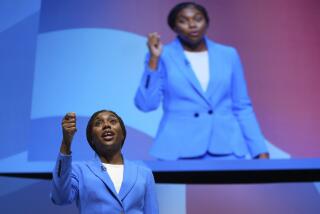Tories Nose Past Labor in Tight British Election : Balloting: Ruling Conservatives could still fall short of a majority, resulting in a ‘hung Parliament.’
- Share via
LONDON — The governing Conservative Party held a tiny lead over its Labor Party opponents in Britain’s national election early today, and projections indicated that the Conservatives would win the barest overall majority in Parliament.
The cliffhanger early results suggested that, at the 11th hour, the Tories had reversed their standings in public opinion polls and squeaked in for their fourth consecutive term at the leadership of the British government.
So close was the race that the final results will not be known until later today, and analysts said it was still possible that the Tories would fall short of an absolute majority, resulting in a “hung parliament.”
The television computer projections for the 651-seat House of Commons were made by both British television networks and were based on their own analyses, rather than official poll results.
Those projections indicated that the Conservatives would win an absolute majority by only a handful of seats--which would nevertheless ensure that they could form a government under their incumbent prime minister, John Major.
It would be the first time a British political party had won four successive elections since the early 19th Century.
Early today, the computer projections showed the Conservatives with 328 seats--with 326 needed--and Labor holding 274, with the rest about evenly divided between the third-party Liberal Democrats and minor parties in Scotland, Wales and Northern Ireland.
The Reuters news agency projected that the British stock market’s key index could jump 150 to 200 points today, from Thursday’s close of 2,436.4, in an expression of investors’ relief over what appears a Tory victory.
The apparent results represented a bitter disappointment for the Labor Party and its leader Neil Kinnock, who had been riding a groundswell of public opinion polls that showed his party slightly in the lead for the past several weeks.
In the week leading up to the election, opinion polls showed Labor running slightly ahead of the Conservatives. But experts saw the apparent results as reflecting an 11th-hour switch to the Tory side by many undecided voters, despite the Tories’ failure to end Britain’s deep economic recession.
The election was the closest in many years in Britain, with the Conservatives’ majority of 101 seats in the last national elections in 1987 drastically reduced, political analysts said, because of dissatisfaction with the economy.
On a day that was sunny throughout most of the British Isles, early results showed about 76% of the 43.6 million voters in England, Scotland, Wales and Northern Ireland cast ballots. Polls closed at 10 p.m. (2 p.m. PDT).
Labor leader Kinnock had confidently predicted that the leftist party would return to power after 13 years in the political wilderness.
Labor’s main campaign platform insisted that its politicians were in a much better position to bring the country out of the recession, and Labor campaign manager John Cunningham declared that the Conservatives had “lost their moral authority to govern.”
But outgoing Tory member of Parliament Cecil Parkinson countered, “It is ridiculous for Labor trailing behind us to suggest they should govern.”
The hard-fought election had been depicted as a cliffhanger by the public opinion polls and political observers during the sometimes-bitter campaign.
The major issue was the sickness of the British economy and the question of which major party could best manage a turnaround in the recession. The state of the nation’s welfare and health services also was a prime subject of debate.
Kinnock condemned the Conservatives’ 13-year rule, mainly under former Prime Minister Margaret Thatcher and more recently under Major, her successor.
The Tory campaign line was that Labor’s profligate spending for social welfare services would lead to increased taxes and interest rates that would damage any expected economic recovery.
The apparent results were a blow to Kinnock’s Labor, which fought a generally well-regarded campaign and to which the opinion polls gave hope until late in the campaign.
But Labor officials would not comment until the final returns are in, which will not be until late this morning.
“The reluctance of the people to see a Labor government was the decisive factor in this election,” commented Foreign Secretary Douglas Hurd, who easily retained his safe Tory seat.
Up until midnight in Britain, results were indicating that the race could end in a “hung Parliament,” with no major party gaining an overall majority in the Commons and with the composition of a government in doubt. The last time no party won a clear majority in Parliament was in 1974. The Conservatives have run the government since their victory under Thatcher in 1979.
In the event of a hung Parliament, Major, as the incumbent, would have been given the first chance to form a new government.
“A hung Parliament,” said one senior politician, “is like a poker game--with the queen as the dealer.”
Under the unwritten British constitution, Queen Elizabeth II, as head of state, asks the leader of the front-running party to form a government. If his party has no clear majority, he can attempt to form a minority government with his own party alone, or in coalition with smaller parties.
If the queen’s first choice fails, she would then turn to the leader of the party that made the next-strongest showing.
The first test of a new government would be the occasion of the queen’s speech, which is read to Parliament by the monarch. But the label is a misnomer, since the speech is actually the new government’s statement of policy and legislative intention.
More to Read
Sign up for Essential California
The most important California stories and recommendations in your inbox every morning.
You may occasionally receive promotional content from the Los Angeles Times.













